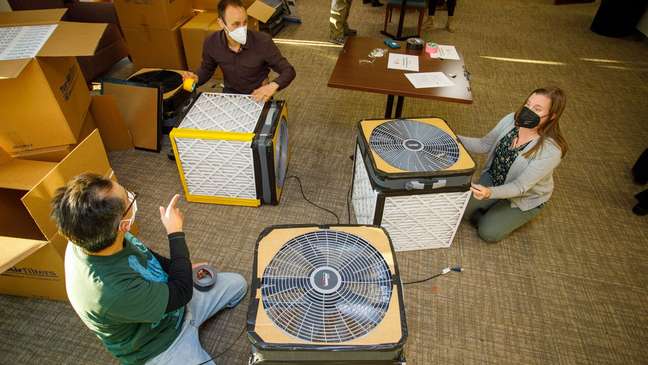The device made with adhesive tape and cardboard boxes manages to reduce the concentration of chemicals that pose health risks
Researchers at Brown University’s School of Engineering and the Silent Spring Institute, both in the United States, have developed a new type of air filter — made from materials that can be found at hardware stores — that can remove pollutants indoors. ‘internal.
- Air pollution associated with increased risk of stroke, study finds
- The gas stove can contaminate the air in your home and cause health problems
According to its inventors, the device called the Corsi-Rosenthal box manages to reduce the concentration of chemicals that pose risks to human health and are associated with various types of respiratory diseases caused not only by viruses, but also by pollutants.
“The Corsi-Rosenthal boxes can be built from simple materials found at hardware stores. We just need four MERV-13 filters, duct tape, a roughly 20-inch fan, and a regular cardboard box,” the professor explains. of epidemiology Joseph Braun, lead author of the study.
efficient air filter
To test the effectiveness of air filters, the scientists compared the concentrations of semivolatile organic compounds in a room before and during use of the Corsi-Rosenthal box. The idea was to demonstrate how the device can improve indoor air quality.

The results showed that the equipment was able to reduce the concentration of various PFASs (synthetic chemical compounds found in cleaning products, fabrics and yarn insulation) by 40% to 60%. Additionally, the filtration system also reduced phthalates (found in building materials and personal care products) by 30% to 60%.
“PFAS and phthalates are linked to several health problems, including asthma, low birth weight, impaired brain development in children and some cancers. Additionally, these pollutants have been associated with reduced vaccine response and may also increase severity and susceptibility to the covid-19 virus in adults,” adds researcher Robin Dodson.
Cheap and easy to make
According to the scientists, the Corsi-Rosenthal boxes are convenient, easy to make and relatively inexpensive. Each unit built with materials readily available in supermarkets and department stores costs about US$100 (about R$530 at current prices).
One drawback is the noise the boxes make as they work. Each piece of equipment increases noise levels by five decibels during the day and about ten decibels during the night, which can be considered distracting in indoor environments such as classrooms.
“We are aware that this noise can be annoying in the long term, but the benefits that the Corsi-Rosenthal boxes bring to people’s health far outweigh the side effects caused by the slightly above normal noise level”, concludes Professor Joseph Brown.
Source: brunette university
Trending on Canaltech:
- Chinese scientists create a laser pen that “writes” in the air
- Sex extortion scam now uses victims’ social security numbers to appear real
- The JetRacer flying chair could be launched in 2023
- Do you know the difference between the mosquito and the dengue mosquito?
- 8 companies entered bankruptcy or judicial recovery in 2022
- Covid-19: Anvisa approves the sale of the antiviral molnupiravir in pharmacies
+The best content in your email for free. Choose your favorite Terra newsletter. Click here!
Source: Terra
Camila Luna is a writer at Gossipify, where she covers the latest movies and television series. With a passion for all things entertainment, Camila brings her unique perspective to her writing and offers readers an inside look at the industry. Camila is a graduate from the University of California, Los Angeles (UCLA) with a degree in English and is also a avid movie watcher.






